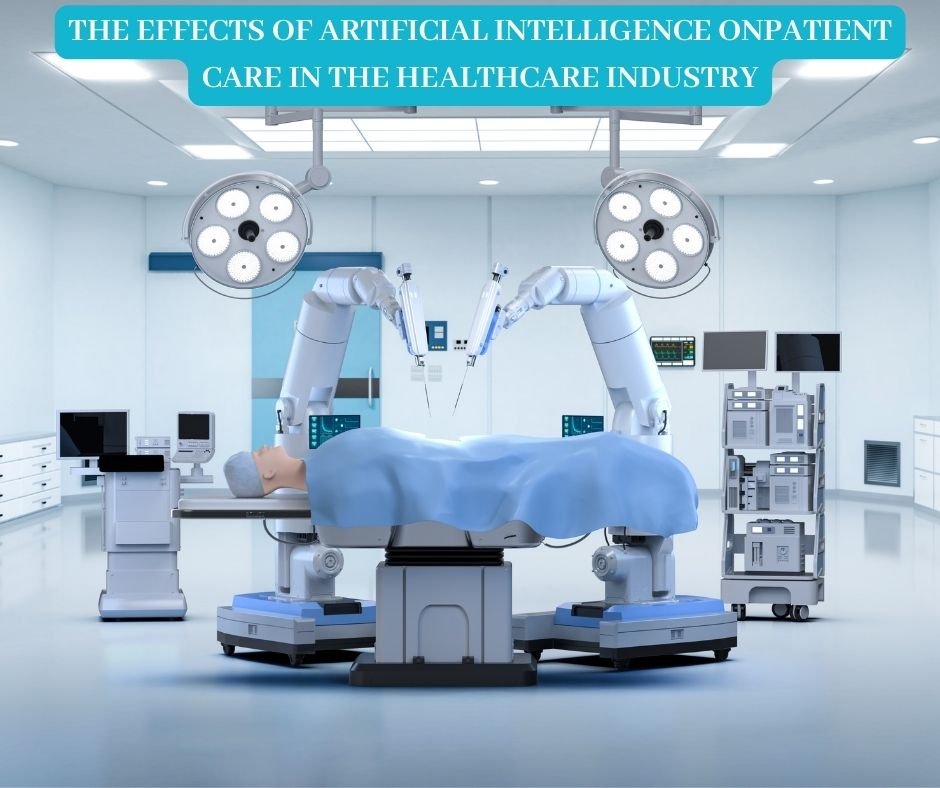Introduction:
Artificial intelligence (AI) has been recognized as a paradigm-shifting force in the field of
healthcare in recent years, fundamentally altering the processes of patient evaluation, therapies,
and care. This state-of-the-art technology is significantly transforming medical practice,
augmenting patient results, and enhancing the provision of healthcare as a whole. In this
discourse, we will look at the far-reaching implications that AI can have for the healthcare
industry and patients.
- Improved diagnostics:
In the field of medical diagnosis, artificial intelligence has demonstrated itself to be an
innovative force. With unprecedented speed and precision, algorithms powered by AI can
analyze massive quantities of patient data, including medical images, lab results, and patient
history. This means that maladies such as cardiovascular conditions and cancer can be detected
at earlier stages, enabling prompt treatment and potentially better prognoses. Additionally,
artificial intelligence (AI) has the potential to aid healthcare practitioners in interpreting the
results of intricate imaging studies, thereby mitigating the likelihood of incorrect diagnoses and
optimizing methods for therapy. - Personalized treatment strategies:
Tailored treatment strategies for particular patients constitute one of the most substantial
advantages of AI in medical care. By analyzing patient data, such as medical history, genetic
information, and lifestyle factors, AI algorithms may identify which treatments are most
effective for each individual. By preventing pointless interventions, this customized approach not
only improves treatment outcomes but also minimizes adverse effects and reduces costs
associated with healthcare. - Predictive analytics:
Artificial intelligence is enabling predictive analytics, which is revolutionizing how medical
professionals manage patient care. By analyzing patterns in historical data, AI algorithms are
capable of estimating the probability of forthcoming health events, including but not limited to
hospital readmissions, medication non-adherence, and the advancement of the disease. This
enables healthcare practitioners to proactively intervene, thereby ensuring prompt solutions and
the prevention of adverse outcomes. Moreover, by optimizing resource allocation, predictive
analytics can guarantee that healthcare facilities function with optimal efficiency and
effectiveness. - Telemedicine and remote monitoring:
Telemedicine and remote tracking have become more effective and accessible since the advent
of artificial intelligence. AI-driven devices have the capability to consistently monitor the vital
signs of patients, identify any irregularities, and immediately inform healthcare providers of
possible health concerns. This technology enables patients to receive prompt interventions
remotely, eliminating the necessity for frequent hospital visits and enhancing patient satisfaction
as a whole. In addition, AI-powered telemedicine platforms facilitate remote consultations
between patients and healthcare providers, thereby increasing access to healthcare and
surmounting geographic constraints. - Administrative process streamlining:
Artificial intelligence is streamlining bureaucratic processes in the healthcare industry, which is
reducing documentation and increasing efficiency. By automating tasks like invoicing, medical
coding, and appointment scheduling, AI-powered solutions enable healthcare professionals to
devote more time and effort to delivering care for patients. Additionally, AI algorithms are
capable of analyzing sizable datasets to find inefficiencies in the delivery of healthcare and
suggest advancement strategies, which ultimately improve care quality and accessibility. - Ethical challenges and considerations:
Despite the many possible advantages that AI may bring to the healthcare sector, its
implementation presents ethical concerns and obstacles that must be duly acknowledged and
resolved. Careful management of concerns such as algorithm bias, patient privacy, and data
security is imperative to guarantee that AI technologies adhere to ethical norms and do not
further compound pre-existing healthcare inequalities. Further, it is imperative that health care
providers obtain sufficient training in order to employ AI in a manner that is both effective and
ethical, thereby ensuring the protection of patient welfare and maximizing the potential of this
revolutionary technology.
Conclusion:
Artificial intelligence opens up unparalleled prospects for enhancing healthcare delivery,
treatment, and diagnosis, thereby transforming patient care and healthcare. Through the
implementation of surveillance remotely, predictive analytics, and increased diagnostics, AI is
transforming the delivery and experience of healthcare. By conscientiously adopting AI
technologies and attending to ethical concerns, it is possible to fully exploit the capabilities of AI
for the purpose of forging a future that is both better for health and equitable for all.
References:
Ross, S.E., et al., Expectations of patients and physicians regarding patient-accessible
medical records. Med. Internet. Res. 7(2):13, 2005
Rosenkrantz, A.B., and E.R. Flagg, survey-based assessment of patients’ understanding
of their own imaging examinations. Am. Coll. Radiol. 12(6):549–555, 2015.
Chen, H., S. Compton, and O. Hsiao. DiabeticLink is a health big data system for patient
empowerment and personalized healthcare. in the International Conference on Smart
Health. Springer, 2013.




